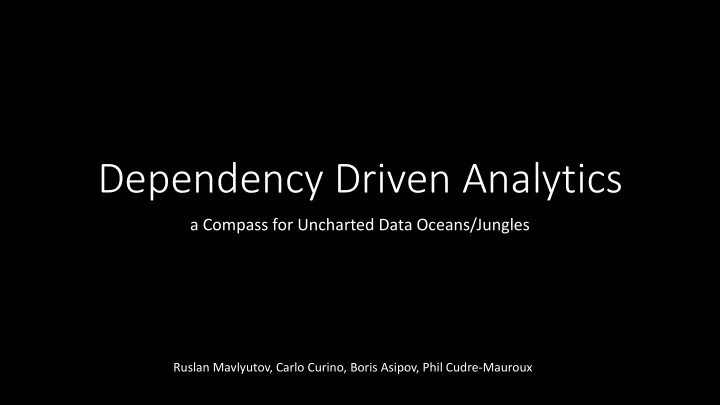

Dependency Driven Analytics a Compass for Uncharted Data Oceans/Jungles Ruslan Mavlyutov, Carlo Curino, Boris Asipov, Phil Cudre-Mauroux
The production job “ JobA ” failed… impact? debug? re-run?
1) look in the logs PBs of daily
2) ask local experts (they know “how” to look)
But don’t bother them too much…
The Problem Focused analyses of massive, loosely structured, evolving data has prohibitive cognitive and computational costs.
The Problem Focused analyses of massive, loosely structured, evolving data has prohibitive cognitive and computational costs. Cost of understanding raw data Cost of processing raw data
A better vantage point?
Dependency Driven Analytics (DDA) DDA today DDA vision • Derive a dependency graph (DG) from raw data • Automation • Language-integration • Real-time • … The DG serve as: • Conceptual Map , and • Sparse Index for the raw data
DDA: infrastructure logs “incarnation” “JobA’s impact?” Query Interface • The DG stores: provenance + telemetry • NODES: jobs / files / machines / tasks / … • EDGES: job-reads-file, task-runs-on-machine • PROPERTIES: timestamps / resources usage / … Raw data (logs)
Current implementation Dependency Querying Definition Graph Big Data Raw System System Data Schema + extr. rules Scope/ Raw Cosmos Neo4J Data dependency Raw Extraction Storage graph Data
Extract “jobs processing hours” extStart = EXTRACT * FROM "ProcStarted_%Y%m%d.log" USING EventExtractor("ProcStarted"); startData = SELECT ProcessGuid AS ProcessId, CurrentTimeStamp.Value AS StartTime, JobGuid AS JobId FROM extStart WHERE ProcessGuid != null AND JobGuid != null AND CurrentTimeStamp.HasValue; … procH = SELECT endData.JobId, SUM((End - Start).TotalMs)/1000/3600 AS procHours, FROM startData INNER JOIN endData ON startData.ProcessId == endData.ProcessId AND startData.JobId == endData.JobId GROUP BY JobId; OUTPUT (SELECT JobId, procHours FROM procH) TO "processingHours.csv";
Example: “Measure JobA’s impact” graph.traversal().V() .has("JobTemplateName","JobA_*") .local( emit().repeat(out()).times(100) … .hasLabel("job").dedup() .values(“ procHours").sum() ).mean()
DDA: Initial Experiments Improvements of up to: • 7x less LoC* • 700x less run-time • > 50,000x less CPU-time • > 800x less I/O * Heavy under-representation of hardness of baseline
Not all queries are as easy… UI (keyword search) Simple search/browsing Graph queries on DG Local or agg. queries on telemetry / provenance (i.e., covering index) Neo4J Mix of DG and raw data Complex/AdHoc queries Scope/ + (e.g., debugging) querying (clumsy today) Cosmos Neo4J
DDA: open challenges • Automatically “map” the raw data • Real-time log ingestion at scale • Scale-out graph management • Leverage specialized graph structures • Integrated language for graph+relational+unstructured
Scope Internet of Things Infrastructure logs Enterprise Search …
Conclusions Problem: • Focused analyses of massive, loosely structured, evolving data has prohibitive costs DDA solution: • Extract a Dependency Graph (DG) conceptual map + sparse index • Current impl. leverages existing BigData/Graph tech Open challenges: • automation / real-time / scalable graph tech / integrated language
Recommend
More recommend